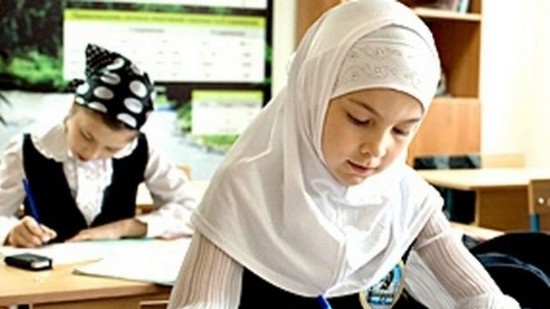Egyptian women's rights organisation New Women Foundation (NWF) has called on the education ministry to ensure that schoolgirls are not forced to wear the Islamic headscarf as part of the dress code in schools all over the country, said the campaign coordinator Lamya Lotfey.
Campaign calls for end to forcing girls to wear headscarves in some schools in Egypt
TEST2
Copts and Poliltical Islam
04:10
Wednesday ,26 October 2016

The NWF launched a campaign last week titled “no to imposing the veil on school girls” after Lotfey's daughter was punished for not wearing the veil in her middle school in Sharqiya governorate.
“After my daughter's case, we [the NWF] received a number of complaints leading us to launch this campaign nationwide,” Lotfey said in an interview with Ahram Online.
“My own daughter endured physical punishment for not wearing the veil after being instructed to,” she said, explaining that a teacher made her stand in the playground after school hours.
“My husband and I immediately filed a formal complaint with the educational directorate in the governorate... Frankly, the officials responded quickly and investigated the issue.”
Lotfey reveals that the investigations showed that it was a personal decision by the headmistress so girls would not get “harassed.”
“This is a part of the harassment cycle,” Lotfey said, adding that boys should be taught to respect the girls in class as their colleagues.
On Monday, the deputy education minister assigned to Sharqiya sent a written order to all schools in the northern governorate clearly stating that the headscarf is not part of the obligatory dress code for girls, but merely a personal choice.
Lotfey said that the campaign demands that this order be instated in schools nationwide.
“Even Christian schoolgirls can be forced to wear the Islamic veil during school.”
“There should be a clear sign [posted in schools] stating that the veil is a choice, instead of the signs at some schools stipulating that the veil is part of the required dress code,” Lotfy stressed.
There have been other high-profile incidents in recent years of schoolgirls forced to cover their hair or were punished for not wearing a veil.
Most recently, in March 2016, a teacher in Fayoum governorate cut a strand of hair off a fifth grade student and subjected her to corporal punishment in front of her classmates for not wearing a veil.
In 2012, a female teacher in the Upper Egyptian city of Luxor cut the hair of two sixth-grade girls for coming to class without wearing a head scarf.
The teacher, who was referred to investigation afterwards, threatened other girls in the class with the same punishment if they failed to wear the veil.
Last August, education ministry spokesman Hany Kamal told Aharm Online amid rumours of a ban on the Islamic veil in schools that “there is no such thing as a hijab ban, wearing the hijab or taking it off is personal choice.”
There is no law in Egypt that regulates dress codes or bans the hijab, Kamal added.
The NWF says that it has received complaints saying that some schools have had the headscarf as part of the dress code for up to one year, yet the cases were not reported.
“Parents should also be more proactive and report such cases to either the school or the education directorate,” adding that formal channels for submitting complaints should be set up within schools.
“Forcing the veil on schoolgirls is an attack on their personal rights, as it is a violation of their right to choose and [affects] their psychological wellbeing,” Lotfey said in a Facebook post at the start of the NWF campaign.



